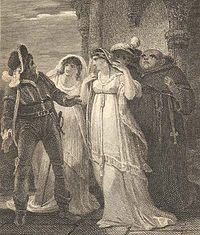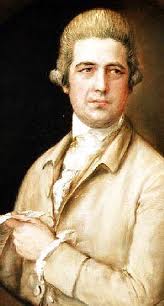Annotation:Come Now for Jest and Smiling: Difference between revisions
(Created page with "'''Back to [[{{BASEPAGENAME}}]]''' ---- <p><font face="garamond, serif" size="4"> '''COME NOW FOR JEST AND SMILING.''' English, Air (whole time). D Major. Standard tuning (fid...") |
No edit summary |
||
| (9 intermediate revisions by 2 users not shown) | |||
| Line 1: | Line 1: | ||
---------- | |||
---- | {{TuneAnnotation | ||
|f_tune_annotation_title= https://tunearch.org/wiki/Annotation:Come_Now_for_Jest_and_Smiling > | |||
'''COME NOW FOR JEST AND SMILING.''' English, Air (whole time). D Major. Standard tuning (fiddle). AABB. The melody is the air to a song in Richard Sheridan and Thomas Linley's (Sr. and Jr.) opera '''The Duenna''' | |f_annotation=[[File:duenna.jpg|200px|thumb|right|The Duenna]] | ||
'''COME NOW FOR JEST AND SMILING.''' English, Air (whole time). D Major. Standard tuning (fiddle). AABB. The melody is the air to a song in Irish playwright [[wikipedia:Richard Brinsley Sheridan|Richard Brinsley Sheridan]] (1751–1816) and Thomas Linley's (Sr. and Jr.) three-act comic opera '''The Duenna''' [http://en.wikipedia.org/wiki/The_Duenna] [http://www.iment.com/maida/familytree/henry/music/duenna.htm]. The libretto was by Sheridan, while music was composed by the Linleys, and it was first staged in Covent Garden in 1775, to great acclaim. The opera was performed no less than seventy-five times during the first season, and frequently staged in revivals through the middle of the next century. | |||
[[File:linleyelder.jpg|200px|thumb|left|Thomas Linley the elder (1733-1795)]] | |||
|f_source_for_notated_version= | |||
|f_printed_sources= Aird ('''Selection of Scotch, English, Irish and Foreign Airs, vol. 3'''), 1788; No. 497, p. 191. | |||
|f_recorded_sources= | |||
|f_see_also_listing= | |||
}} | |||
Latest revision as of 16:33, 18 May 2024
X:1 T:Come now for Jest & Smiling M:C L:1/8 R:Air Q:"Lively" B:James Aird – Selection of Scotch, English, Irish and Foreign Airs, vol. 3 (Glasgow, 1788, No. 497, p. 191) N:”Humbly dedicated to the Volunteers and Defensive Bands of Great Britain and Ireland” Z:AK/Fiddler’s Companion K:D A2|d2d2e3e|f4 f2e2|f2e2f2^g2|A4 a2 ef| g2g2f2d2|e2c2A2 ag|f2g2 Te3d|d6:| |:f2|e2a2a2^g2|a6 e>f|g2g2 f3e|e6 ag| f2d2a4|ABcd ef g2|f3g Te3d|d6:|]

COME NOW FOR JEST AND SMILING. English, Air (whole time). D Major. Standard tuning (fiddle). AABB. The melody is the air to a song in Irish playwright Richard Brinsley Sheridan (1751–1816) and Thomas Linley's (Sr. and Jr.) three-act comic opera The Duenna [1] [2]. The libretto was by Sheridan, while music was composed by the Linleys, and it was first staged in Covent Garden in 1775, to great acclaim. The opera was performed no less than seventy-five times during the first season, and frequently staged in revivals through the middle of the next century.


